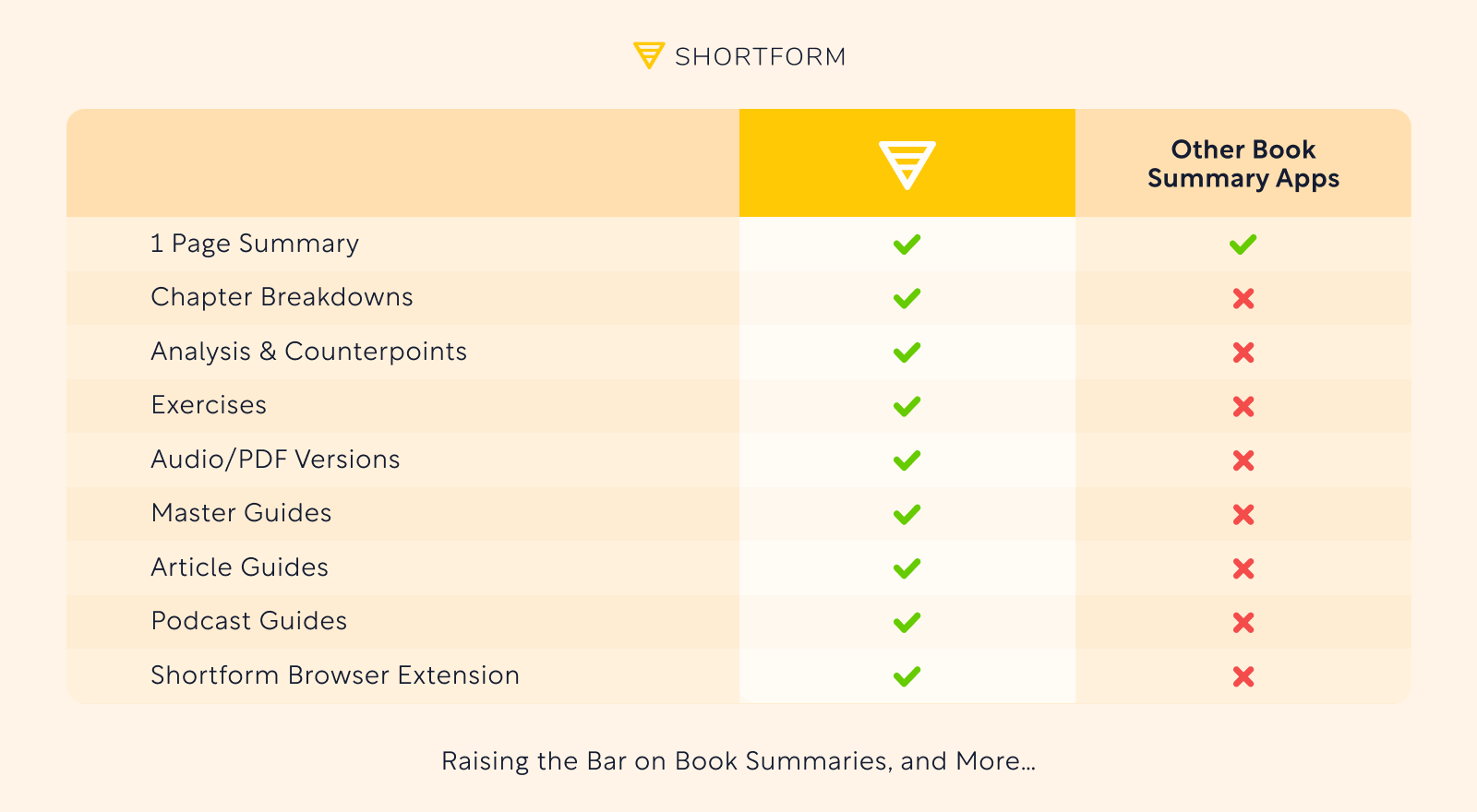Eternally-Minded Time Management
|
Read or listen in your browser or watch on YouTube. You manage your time based on the outcome you want to achieve. So, how does the fact that we will live for eternity transform how we manage our time in this life? BROUGHT TO YOU BYShortformReading a book is a big investment, so you want to make sure you choose carefully. That’s why I use book summaries to preview nonfiction books before I commit to reading them. But there are so many book summary apps out there these days. So, let me tell you real quick why I think Shortform is the best of them. Shortform provides guides and summaries of the best nonfiction books. Whether it’s a personal development book like Atomic Habits by James Clear or Christian books like The Ruthless Elimination of Hurry by John Mark Comer, Shortform has you covered. But Shortform takes it deeper than other book summary apps.
They provide in-depth chapter breakdowns, comparing the book’s arguments to what other authors say on the same topic. The analysis is top-notch and actually makes you think. No joke, I’ve had a couple of times where I read the summaries for a book I’d already read, and I thought the Shortform summary was actually better than the book itself! So, if you want to save time and get the best book summary app out there, check out Shortform. You can get a 20% discount using my link: shortform.com/reagan
Interested in sponsoring the newsletter? Let’s talk about motivation. While studying the topic of video game addiction for A Student’s Guide to Gaming, I was surprised to discover that video game addicts tend to be highly motivated people. It’s not that the video game addict is lazy, or that they lack motivation, but rather that they have misplaced motivation. When a person becomes overly motivated by in-game rewards, he or she begins to neglect real-life responsibilities. They are pursuing the wrong reward. This is the key to understanding motivation: We are all driven by the promise of reward. Whether it’s a good feeling, financial benefit, or fame, humans are wired to persevere when we believe the reward will be worth the effort. So, this raises a question. What should motivate Christians? I argue that it’s our faith in the promises secured by Jesus Christ that motivates a believer to seek to lead a fruitful life for God’s glory. In short, we are motivated by eternity, when we will be with Christ forever and receive our reward from Him. But too often, when we think about managing our time from week to week, we find ourselves looking to lesser motivations. The Reward of RichesMost productivity books are geared toward businesspeople. Whether it’s getting a promotion, building a successful business, or retiring early, the promise of secular productivity is a life of financial prosperity. Money is assumed to be the obvious incentive for being productive. But this motivation presents a problem for Christians because the Scriptures warn us that love of money is dangerous (1 Timothy 6:9–10). We can’t let the reward of riches be the motivation for our productivity. The Promise of PeaceThe second bad motivation for productivity is the promise of peace. Maybe you’re looking to productivity not primarily for wealth but for control. Life is chaotic, and you feel that if you could get a bit more organized, you would finally find some peace. You want productivity to earn you time, not money. Indeed, productivity often does lessen feelings of stress and worry. A well-ordered life tends to lead to less anxiety as we become better at keeping our commitments. But if believers hold up peace as our main motive for being productive, we may overlook the peace we already have through faith in Jesus Christ. And even peace can become an idolatrous motivation for productivity. The Praise of PeopleA third bad motivation for productivity is the praise of men. Perhaps you aren’t seeking riches or peace, you just want others to notice your accomplishments. This is a pernicious motivation because it can look so much like faithfulness. For example, consider the guy who always stays late to help clean up after events at church or the woman who shows up before her boss to work each day. Those are good things in and of themselves, but if the reason for those productive efforts is just to look good to others, that’s a problem. When you do a good thing with a bad motive, you are doing a bad thing. This is the motivation that drives empty religion; this was the motivation of the Pharisees! If you get organized, set goals, manage your tasks, and work hard so people will think highly of you, you’ve missed the mark. The purpose of productivity is the glory of God, not your glory. The Lure of LegacyThe fourth bad motivation for productivity is the lure of legacy. This motivation is just the praise of men in a more palatable form. Some people are motivated not by concern about money, peace, or what others around them will think but instead by a desire to leave a legacy for future generations. This sounds much nobler than being productive for the praise of men, but the lure of legacy is just a similar motivation in a time machine. Of course, we all want to be thought well of after we’re dead and gone, and legacy is not wholly a bad thing. But the lure of legacy must not be the chief motivation of a Christian. We cannot be motivated to productivity by the hope that others will make a positive assessment of our life when we’re gone. Instead, we need to be motivated by how God will assess our life. The Right Motivation: EternityInstead of looking for what productivity can get us in this life, we look beyond to where our true home is. This is just how the Scriptures motivate us to love and good works in this life. We don’t lay up treasure on earth; we lay it up in heaven (Matthew 6:19–21). We exercise self-control to receive an imperishable wreath (1 Corinthian 9:25), we endure affliction for the promise of an eternal weight of glory (2 Corinthians 4:17), and we steward our money to make friends for eternity (Luke 16:9) and for the praise that comes from God (Matthew 25:14–30). The lesser motivations of temporal riches, peace, or human praise are all dwarfed by what eye has not seen, nor ear heard. We don’t want to live our lives lazily, just to get by. But nor do we want to hustle for that which doesn’t last. I want to labor with all His might for that crown that doesn’t fade. I want to steward my time that I might hear that “well done.” I want to be an unashamed workman. I want that glory that never fades. We do care about productivity, we do care about managing our time, but we care about doing it not merely in light of what it might gain us in this life but in light of eternity. Note: Part of this post was adapted from Redeeming Productivity: Getting More Done for the Glory of God. Reagan RoseI talk about personal productivity from a Christian perspective. Creator of Redeeming Productivity. Take your productivity to the next levelListen to the Podcast → The Redeeming Productivity Show is available on all podcast platforms and YouTube. Get the Book → Grab a copy of Redeeming Productivity: Getting More Done for the Glory of God Join the Academy → Get access to all of our courses, workshops, private community, book club, and more Use the Planner → The all-in-one productivity system designed for Christians |
Redeeming Productivity
Join over 10,000 believers receiving weekly insights and resources on productivity from a Christian perspective in their inboxes.
Issue #182 Your weekly roundup of insights and resources to help you get more done for the glory of God. Read on the Web In Today’s Issue: Glorifying God Through Productivity Jonathan Edwards on Time Your Holy Deeds Are Not Filthy Rags Eternally-Minded Time Management Post-Summer Productivity Reset Dear steward, I pray you and yours are doing well! Our family has been closing out the summer season with a beach vacation. We head home tomorrow. Out to dinner to celebrate 13 years of marriage...
Issue #181 Your weekly roundup of insights and resources to help you get more done for the glory of God. Read on the Web In Today’s Issue: Fall Habit Reset It Takes Years to Grow The Dutiful Introvert Is It Okay to Seek Heavenly Rewards? An App for Taming Your Email Inbox Dear steward, Are you experiencing any of these symptoms? Habits are out of whack (especially spiritual disciplines) Lack of clarity about what you should be focused on A general sense of overwhelm Well, you may be suffering...
Read or listen in your browser or watch on YouTube. A big part of productivity is managing your time. Google “time management,” however, and you’ll be met with a deluge of articles on to-do lists, calendar management, scheduling, and more. It can be a little overwhelming. So I want to offer a simple list of five time management strategies, that I think will give you the most bang for your buck. These five strategies, if applied, will help you make significant progress in how you steward their...


